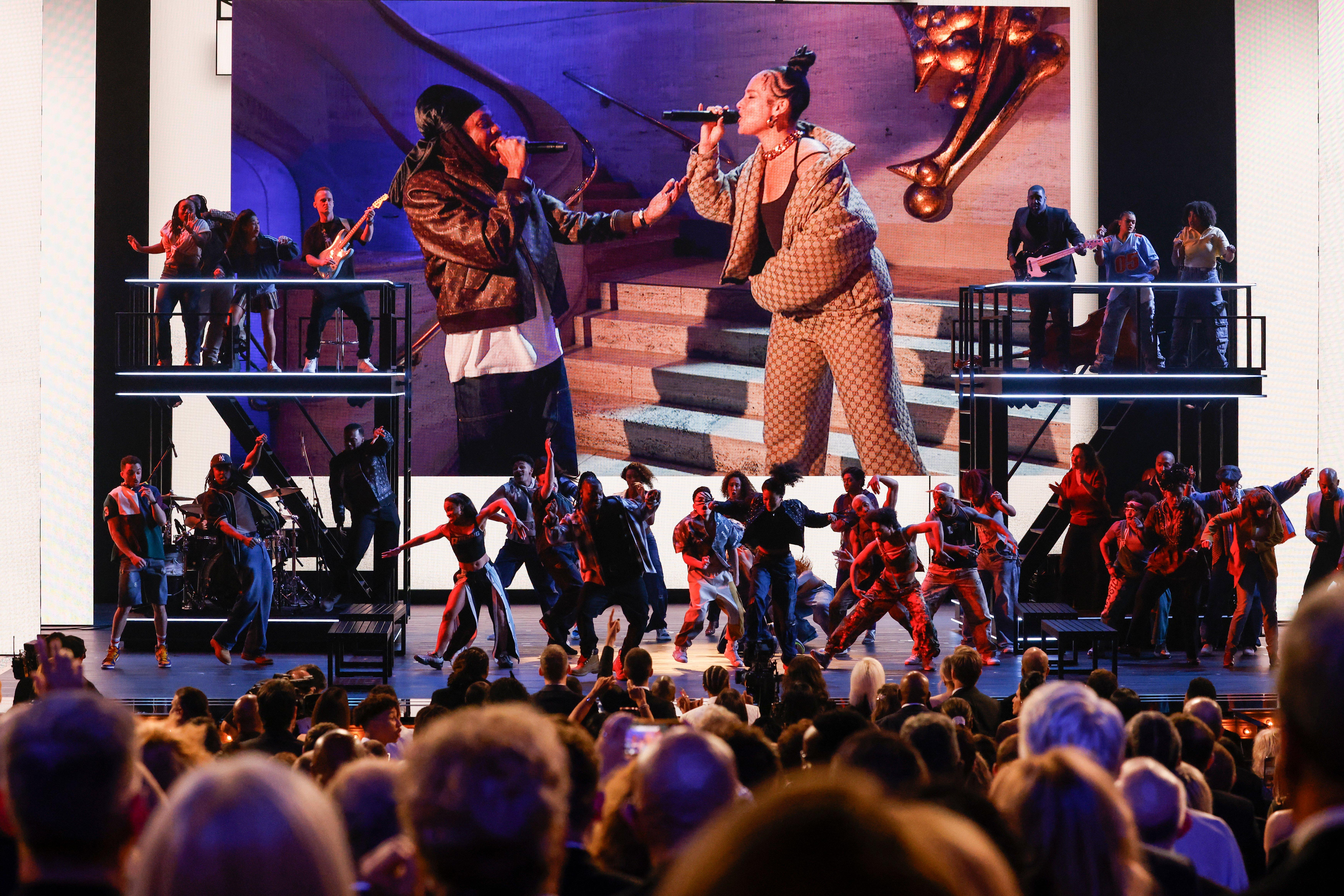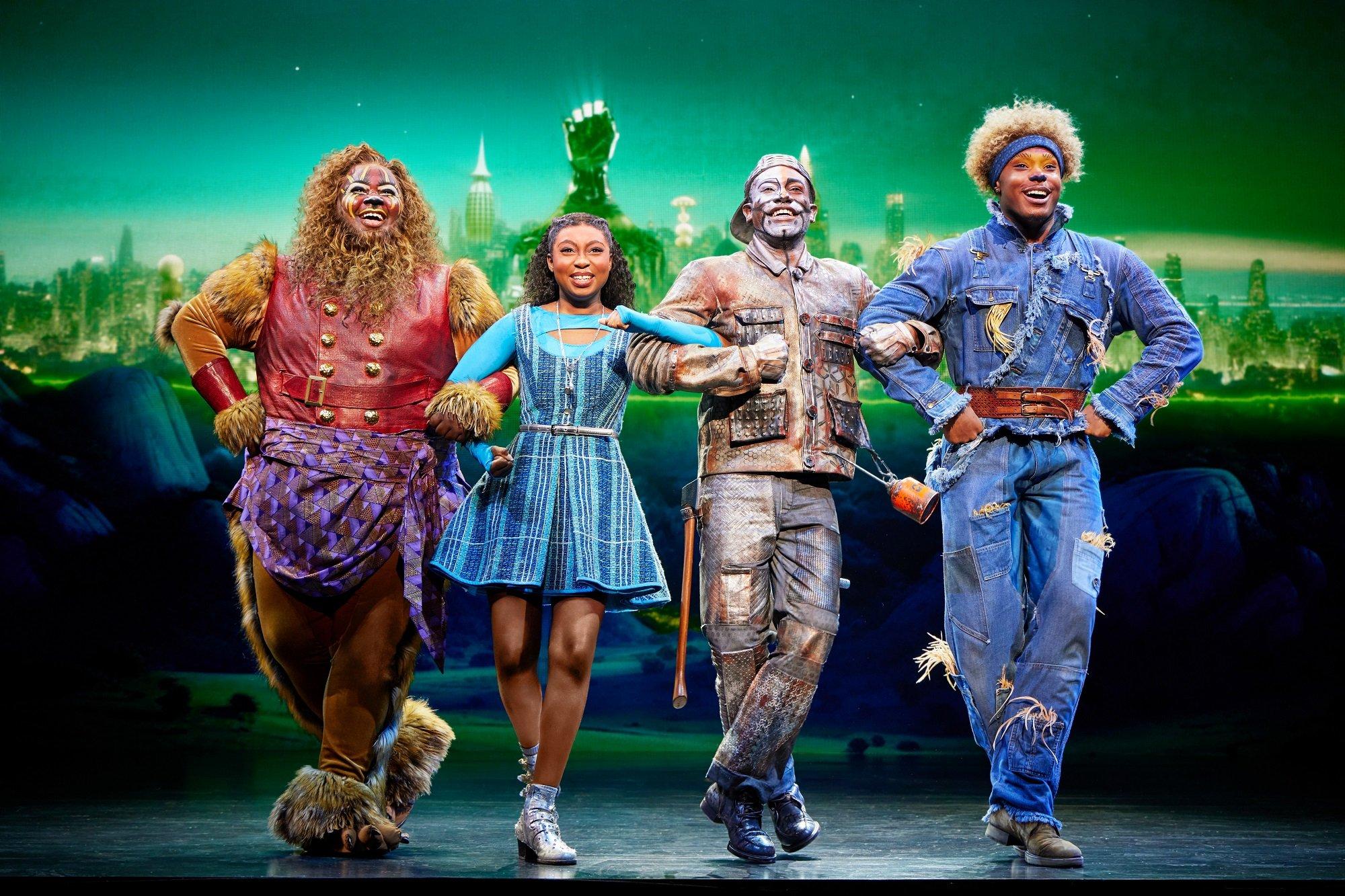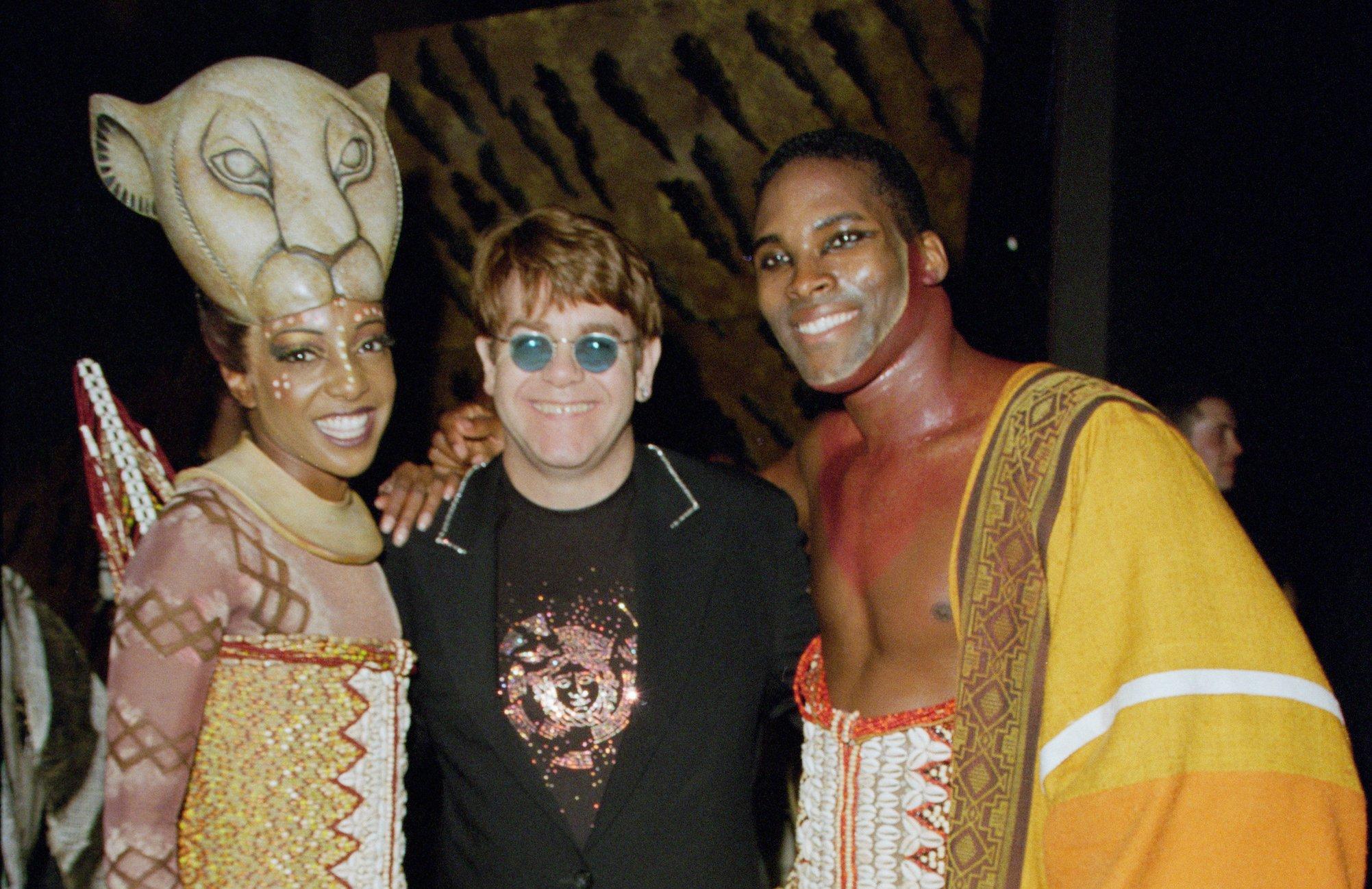The GRAMMYs have had a category for original cast albums every year since the inception of the awards in 1958. The category was called Best Original Cast Album (Broadway Or TV) that first year. It's now called Best Musical Theater Album.
Over the years, 40 talented individuals have won both a GRAMMY in the cast album category and one or more Tony Awards for their work on a given show. Stephen Sondheim has won both awards for his work on five different shows — "Company," "A Little Night Music," "Sweeney Todd," "Into The Woods," and "Passion." Richard Rodgers, Andrew Lloyd Webber, Tim Rice, and Stephen Oremus have each won both awards for their work on two different shows.
To get you in the mood for this year's Tony broadcast, which airs June 8 on CBS, here's a list of everyone who has won a GRAMMY in the cast album category and also received one or more Tonys for the same show.
1958: "The Music Man," Meredith Willson, composer/lyricist. As the show's composer/lyricist and co-writer of the book, Willson shared the prize when this won a Tony for Best Musical. The Beatles later included the show's wistful ballad, "Till There Was You," on Meet The Beatles!
1959: "Redhead," Gwen Verdon, principal soloist. GRAMMYs were awarded to the stars of the shows, rather than the creators, this year. That worked out well for Verdon, who tied for the GRAMMY with Ethel Merman ("Gypsy") and also won a Tony for Best Actress (Musical).
1960: "The Sound Of Music," Richard Rodgers, composer; Oscar Hammerstein II, lyricist. As the show's creators and co-producers, Rodgers and Hammerstein shared in the victory when "The Sound Of Music" won for Best Musical (in a tie with "Fiorello!"). The show spawned such standards as "Climb Ev'ry Mountain" and "My Favorite Things."
1961: "How To Succeed In Business Without Really Trying," Frank Loesser, composer/lyricist. As the show's creator, Loesser shared the Tony for Best Musical. The show, which also won a Pulitzer Prize, featured "I Believe In You" and "Brotherhood Of Man."
1962: "No Strings," Richard Rodgers, composer/lyricist. Rodgers won a Tony for Best Composer and also received a special Tony. The standout song from the show, "The Sweetest Sounds," received a GRAMMY nomination for Song Of The Year.
1967: "Cabaret," John Kander, composer; Fred Ebb, lyricist. The Tonys said "Willkommen" to Kander and Ebb with Tonys in the Best Musical and Best Composer and Lyricist categories.
1970: "Company," Stephen Sondheim, composer/lyricist. Sondheim won two Tonys: Best Lyrics (Musical) and Best Score. Elaine Stritch's performance of "The Ladies Who Lunch" is legendary.
1973: "A Little Night Music," Stephen Sondheim, composer/lyricist. Sondheim won a Tony for Best Score (Musical). The show's most famous song, "Send In The Clowns," won 1975's GRAMMY for Song Of The Year (after it was popularized by Judy Collins).
1975: "The Wiz," Charlie Smalls, composer/lyricist. Smalls won a Tony for Best Score (Musical). Smalls was the first African-American to win both a GRAMMY and a Tony for his work on a given show. So he didn't just "Ease On Down The Road." He helped pave it.
1977: "Annie," Charles Strouse, composer and album co-producer; Martin Charnin, lyricist. The pair won a Tony for Best Score. "Tomorrow" was ubiquitous in the late '70s. Jay Z sampled "It's The Hard-Knock Life" in the title track for his 1998 GRAMMY-winning album, Vol. 2…Hard Knock Life.
1979: "Sweeney Todd," Stephen Sondheim, composer/lyricist. Sondheim won a Tony for Best Score. Barbra Streisand included "Not While I'm Around" on her 1986 GRAMMY winner, The Broadway Album.
1980: "Evita," Andrew Lloyd Webber, composer and album co-producer; Tim Rice, lyricist and album co-producer. Webber and Rice won a Tony for Best Score. Rice won a second Tony for Best Book (Musical). Olivia Newton-John and Carpenters recorded "Don't Cry For Me Argentina" even before the show opened. Madonna made it a Top 10 hit in 1997.
1982: "Dreamgirls," Tom Eyen, lyricist. Eyen won a Tony for Best Book (Musical). In addition, the show's Tony-winning star, Jennifer Holliday, won a GRAMMY for Best R&B Vocal Performance, Female for the show-stopper "And I Am Telling You I'm Not Going."
1983: "Cats," Andrew Lloyd Webber, producer. Webber had been nominated in this category as a composer in 1982 for the London production of the show. Under GRAMMY rules, composers and lyricists can be nominated in those capacities only once for a specific show. Webber's nomination and win this year were for his role as producer of the Broadway cast album. Webber won a Tony for Best Score in tandem with his lyricist, legendary poet T.S. Eliot. "Memory" is among the most famous theater songs of recent decades.
1987: "Les Miserables," Claude-Michel Schönberg, composer and album co-producer; Alain Boublil, lyricist and album co-producer; Herbert Kretzmer, lyricist. All three men won a Tony for Best Score. Schönberg and Boublil won a second Tony for Best Book (Musical). Susan Boyle later had great success with the show's most famous song, "I Dreamed A Dream."
1988: "Into The Woods," Stephen Sondheim, composer/lyricist. Sondheim won a Tony for Score (Musical). Mandy Patinkin, among others, has recorded the show's most notable song, "Children Will Listen."
1991: "The Will Rogers Follies," Cy Coleman, composer; Betty Comden and Adolph Green, lyricists. The team won a Tony for Best Score (Musical). The show featured "Never Met A Man I Didn't Like."
1993: "The Who's Tommy," Pete Townshend, composer/lyricist. The rock star won a Tony for Score (Musical) (in a tie with Kander and Ebb for "Kiss Of The Spider Woman — The Musical"). The show gave new life to such classics as "Pinball Wizard" and "See Me, Feel Me."
1994: "Passion," Stephen Sondheim, composer/lyricist. Sondheim won a Tony for Original Music Score.
2000: "Aida," Elton John, composer; Tim Rice, lyricist. The team won a Tony for Best Original Musical Score. John was the second British rock star to win both awards. He and LeAnn Rimes had a Top 30 hit with the show's "Written In The Stars."
2001: "The Producers," Mel Brooks, composer/lyricist. Brooks took home three Tonys: Best Musical, Best Original Musical Score and Best Book (Musical). The show included "Springtime For Hitler" and "I Wanna Be A Producer."
2002: "Hairspray," Marc Shaiman, composer/lyricist and album producer; Scott Wittman, lyricist. The team won for Best Original Musical Score. The show spawned "Good Morning Baltimore" and "You Can't Stop The Beat."
2007: "Spring Awakening," Duncan Sheik, composer and album producer; Steven Sater, lyricist. Sheik and Sater shared the Tony for Best Score (Music and/or Lyrics). In addition, each man won a second Tony on his own. Sheik won for Best Orchestrations; Sater, for Best Book of a Musical.
2008: "In The Heights," Lin-Manuel Miranda, composer/lyricist and album co-producer; Alex Lacamoire and Bill Sherman, album co-producers. Miranda won a Tony for Best Score (Music and/or Lyrics). Lacamoire and Sherman shared the award for Best Orchestrations. The show includes "Piragua," named after a Puerto Rican ice dessert.
2011: "The Book Of Mormon," Robert Lopez, Trey Parker & Matt Stone, composers/lyricists and album co-producers; Anne Garefino, Stephen Oremus and Scott Rudin, album co-producers. Lopez, Parker and Stone won Tonys for Best Score (Music and/or Lyrics) and Best Book of a Musical. Parker won a third Tony as co-winner of Best Director (Musical). Garefino and Rudin were among the winners for Best Musical. Oremus was a co-winner for Best Orchestrations.
2012: "Once: A New Musical," Steve Kazee, principal soloist; Martin Lowe, album co-producer. Kazee won a Tony for Best Actor (Musical). Lowe won for Best Orchestrations. The show featured "Falling Slowly," which won an Oscar after it was featured in the 2006 film Once.
2013: "Kinky Boots," Cyndi Lauper, composer/lyricist and album co-producer; Billy Porter, principal soloist; Stephen Oremus, album co-producer. Lauper, who was the 1984 GRAMMY winner for Best New Artist, won a Tony for Best Score (Music and/or Lyrics). Porter won for Best Actor (Musical). Oremus won for Best Orchestrations.
* How about Lena Horne? The legendary star won a special Tony in 1981 for her one-woman show, "Lena Horne — The Lady And Her Music." The cast album from the show, subtitled Live On Broadway, won a GRAMMY for Best Cast Show Album. So why isn't she on the list? The GRAMMY went only to the album's producer, Quincy Jones, so technically she didn't meet our criteria. But, for the record, Horne did take home a GRAMMY for the album in the Best Pop Vocal Performance, Female category.
(Paul Grein, a veteran journalist and music historian, writes frequently for Yahoo Music. His Chart Watch blog runs each Wednesday.)
















